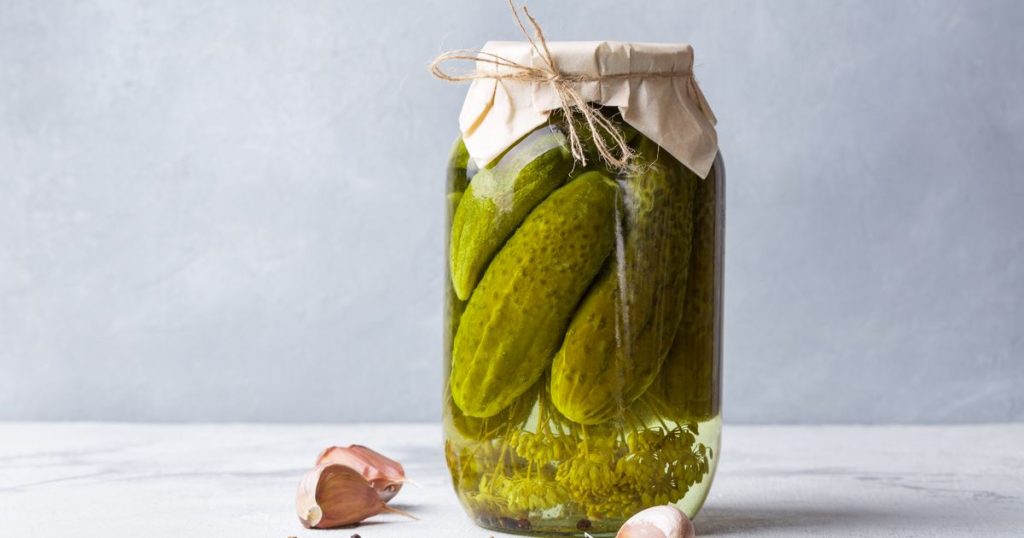The Surprising Health Benefits of Pickles: Why You Shouldn’t Feel Guilty About Your Pickle Habit
Pickles are often misunderstood as a snack that’s more indulgent than wholesome. With their crunchy texture, tangy flavor, and salty bite, it’s easy to assume they’re not doing your body much good. But if you’re someone who loves having a pickle on the side or snacking on them throughout the day, here’s some good news: certain types of pickles can actually be a fantastic addition to a healthy diet. The key lies in understanding the difference between naturally fermented pickles and those made with vinegar. Let’s dive into why pickles might just deserve a spot in your wellness routine.
The Great Pickle Debate: Fermented vs. Vinegar-Based
Not all pickles are created equal, and the way they’re made plays a huge role in whether they’re a health superstar or just a tasty snack. The first step in determining whether your pickles are doing your body good is to check how they’re made. Pickles that are naturally fermented in salt and water are the ones you should be looking for. These pickles go through a process where beneficial bacteria, like lactobacillus, convert sugars into lactic acid, creating a probiotic-rich food that’s as good for your gut as it is for your taste buds. On the other hand, pickles made with vinegar and pasteurized are more about flavor than functionality. These pickles sit on the middle shelves of the grocery store, but they don’t offer the same health benefits as their fermented cousins.
To find naturally fermented pickles, head to the refrigerator case and look for labels that say “lacto-fermented” or “cultured.” These words are your cue that the pickles have gone through the fermentation process and are packed with probiotics. Keep in mind that even if a pickle is labeled as “kosher dill” or “garlic dill,” it might not necessarily be fermented. Always double-check the ingredients list: if vinegar is listed, it’s probably not a fermented pickle.
Why Fermented Pickles Are a Gut Health Powerhouse
The magic of fermented pickles lies in their ability to support gut health. During the fermentation process, beneficial bacteria thrive, creating a food that’s teeming with probiotics. These probiotics are like a welcome mat for your digestive system, helping to introduce healthy bacteria into your gut microbiome. A balanced gut microbiome is the foundation of overall health, playing a role in everything from digestion to immune function.
Personal nutrition coach Sarah Pelc Graca explains that the probiotics in fermented pickles can help improve digestion, reduce inflammation, and even boost your immune system. Registered dietitian Sharon Palmer adds that these live active cultures also increase the diversity and quantity of friendly bacteria in your gut. More good bacteria mean better protection against chronic diseases like type 2 diabetes and cancer. And as if that weren’t enough, the good bacteria in fermented pickles also help maintain a healthy gut pH, creating an environment where harmful bacteria struggle to survive.
Shelf-Stable Pickles: What You Need to Know
If you’re reaching for pickles that sit on the shelf rather than in the refrigerator, don’t panic—they’re not bad for you, but they’re also not as beneficial as their fermented counterparts. The reason comes down to how they’re made. Vinegar-based pickles are pasteurized, which kills off any naturally occurring bacteria and halts the fermentation process. While these pickles are still tasty and can add some excitement to your meals, they don’t offer the same probiotic punch as naturally fermented varieties.
Certified nutrition consultant Allison Gregg notes that shelf-stable pickles often contain artificial preservatives and added sugars, which can negatively impact gut health. However, they’re still a fine choice in moderation. As Pelc Graca points out, these pickles might still provide small amounts of vitamins like vitamin K. So, if you’re a fan of shelf-stable pickles, there’s no need to cut them out completely—just be mindful of how much you’re eating.
Reading Labels and Watching Sodium Content
If you’re determined to make the most of the health benefits pickles have to offer, it’s time to become a label reader. Nutritionist Scott Baptie suggests looking for the words “naturally fermented” on the label, as well as checking for cloudy brine in the container—a sign of probiotic activity. But there’s another important factor to consider: sodium content. Pickles are notoriously salty, and one spear can account for a significant chunk of your daily recommended sodium intake.
While fermented pickles are a great addition to a healthy diet, they shouldn’t be eaten in excess. Moderation is key, especially if you’re watching your sodium intake. But here’s the good news: incorporating fermented pickles into your diet can encourage you to eat more plant-based foods, which is a win-win for your gut health. As Allison Gregg puts it, “The more plants, the better.”
The Bottom Line: Pickles Can Be a Healthy, Delicious Addition to Your Diet
So, the next time you reach for a pickle, don’t feel guilty! Naturally fermented pickles are a delicious way to support your gut health, immune system, and overall well-being. Thanks to their probiotic-rich properties, they’re more than just a tasty side—they’re a wellness powerhouse. Just remember to read labels carefully, keep an eye on sodium content, and enjoy them in moderation. And if you’re a fan of shelf-stable pickles, that’s okay too—just be mindful of what you’re eating and try to incorporate more fermented options into your diet.
In the end, pickles are just one piece of the puzzle when it comes to building a healthy diet. Eating a wide variety of plants and fermented foods like kimchi, sauerkraut, and of course, naturally fermented pickles, can have a significant impact on your gut health and overall wellness. So go ahead and enjoy that pickle—it’s a crunchy, tangy step in the right direction for your body.















